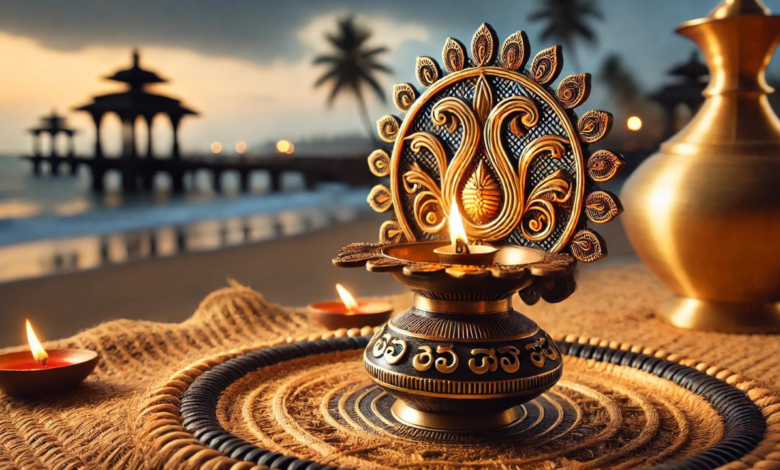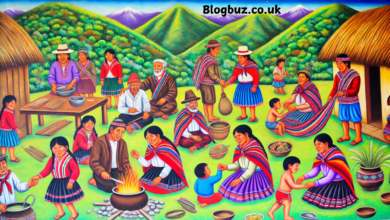Illuminating Heritage: The Cultural and Spiritual Significance of Vavilaku in Tulu Culture

The rich tapestry of India’s cultural heritage encompasses Many traditions that differ by geography. Among these, the Tulu-speaking community of Karnataka, particularly in the coastal regions, holds a unique tradition that has survived the test of time and maintained its cultural significance despite modern influences. This tradition uses “vavilaku”—a traditional oil lamp with profound spiritual and cultural importance within the Tulu community.
Historical Roots of Vavilaku
Oil lamps have been used in spiritual and cultural practices since ancient civilizations worldwide, and the Tulu region of Karnataka is no exception. Vavilaku has been an integral part of Tulu culture, deeply embedded in its rituals and daily practices. Historically, these lamps were primarily made from earthen materials, but over time, they evolved into more elaborate forms made of brass and bronze, often becoming cherished family heirlooms.
Symbolism and Usage
In Tulu culture, vavilaku is not merely a source of light but a symbolic manifestation of divine presence and a tool for spiritual enlightenment. Lighting a vavilaku is believed to dispel darkness, metaphorically representing ignorance, and bringing in light symbolizes knowledge and wisdom. This practice is observed in daily prayers, special festivities, and significant life events such as weddings and housewarming ceremonies.
Vavilaku in Rituals and Festivals
The use of vavilaku in Tulu rituals is extensive. From daily worship in households to its use in grand festivals like Kambala (the buffalo race) and Bhoota Kola (a ritualistic folk dance), vavilaku plays a pivotal role. It is particularly prominent in ceremonies that mark the beginning of something promising, where its light brings good fortune and divine blessings.
Cultural Importance
The cultural importance of vavilaku extends beyond its use in rituals. It symbolizes continuity between generations, often passed down as a family heirloom, each lamp carrying stories and blessings from ancestors. In modern times, even as electric lights have taken over the practical utility of lighting, vavilaku remains a cherished artefact, used extensively during traditional Tulu festivities such as Diwali, known locally as Deepavali, the festival of lights.
Modern Adaptations
Despite the strong wave of modernization, the traditional vavilaku has retained its relevance in Tulu culture. Modern adaptations of these lamps include electric vavilaku, which combine the traditional design with modern technology, making it easier to maintain the tradition even in urban settings. These adaptations are particularly popular among the younger generation, keen on retaining cultural heritage while embracing modern conveniences.
Educational and Preservation Efforts
Recognizing the cultural significance of vavilaku, several community leaders and cultural organizations within the Tulu-speaking regions have initiated efforts to educate the younger generation about this tradition. Workshops, cultural events, and exhibitions are frequently organized to showcase the various types of vavilaku and their significance in Tulu culture.
Conclusion
Vavilaku is a beacon of the Tulu community’s rich heritage, embodying the region’s spiritual beliefs, cultural practices, and ancestral wisdom. As a symbol of light and wisdom, vavilaku continues to shine, bridging the past with the present and carrying forward the legacy of the Tulu-speaking community into the future. By preserving such traditions, the community honours its ancestors and ensures its cultural identity remains vibrant and relevant in today’s globalized world.
FAQs about Vavilaku in Tulu Culture
What is vavilaku?
Vavilaku refers to traditional oil lamps used in the Tulu-speaking community of Karnataka, India. These lamps are functional and carry deep spiritual and cultural significance, symbolizing knowledge, prosperity, and divine presence.
Why is vavilaku important in Tulu culture?
Vavilaku is integral to Tulu culture for its role in daily rituals, festivals, and significant life events. It is believed to ward off darkness (ignorance) and bring light (knowledge), ensuring spiritual purity and divine blessings.
How is vavilaku used in festivals and ceremonies?
In festivals like Deepavali and Kambala, as well as weddings and housewarming events, vavilaku is lit to mark the auspiciousness of the occasion, invoke divine blessings, and foster a spiritual atmosphere.
What materials are used to make vavilaku?
Traditionally, vavilaku were made from earthen materials, but modern versions can be found in brass, bronze, and even silver, each adding to the lamp’s beauty and symbolic value.
How has vavilaku adapted to modern times?
While traditional oil-based vavilaku are still popular, electric versions have become common, especially in urban areas. They allow for easier maintenance and use while retaining their cultural significance.
You May Also Read: Firuñais: A Deep Dive into a Linguistic and Cultural Phenomenon




